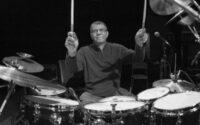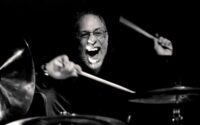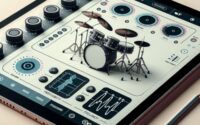Simon Phillips is one of the most prolific drummers of his generation, a true institution in the world of modern drums. The list of artists he has collaborated with would take the entire space we have for this article. Just a few of them, e. g.: Mike Oldfield, The Who, Judas Priest, Jeff Beck, Tears For Fears, Gary Moore, Jack Bruce, David Gilmour, Brian Eno, Joe Satriani, Jon Anderson, Stanley Clarke, is enough to want to know what a player like that has to say and play. There have been a lot more of those sessions, let alone replacing the late Jeff Porcaro as a permanent member of TOTO for 21 years.
You have already been able to enjoy the wonderful drum solo Simon Phillips played during his clinic at the Hard Rock Cafe in Warsaw, Poland, on June 11, 2017, which was organized by the Warsaw-based Pro Drum store. Now, it is time for an in-depth interview exclusively for the viewers of en.beatit.tv.
Simon Phillips talks to BeatIt, Pt. 6

“The last [solo] record was ‘Vantage Point‘, which was in 2000, maybe 2001. I’d been writing material all that time when I had the time, but I didn’t really have the time because Toto was taking up more and more time, and I wasn’t happy with the material. For some reason, I just wasn’t hitting it. I recorded about five songs for a solo record, which are still in the can, but didn’t get it. Then, I think we had some time off from Toto and I phoned my agent. I asked him: ‘Should I be doing another PSP tour or should I do another solo tour?’. He said: ‘Definitely solo tour!’. I went: ‘Oh, OK. Great!’. Then, I thought about it and decided we should have a CD to sell. I thought: ‘I have a studio. If I could get musicians, the NAMM Show’s coming up’. That means Andy Timmons, and I love playing with him. That was my first call. I went: ‘Andy, wanna make a record and then go out and tour?’. He said: ‘Sure!’. I said: ‘Great!’. Then, I rang Steve Weingart ‘cause we’d been working together: ‘Hey, Weinie! Do you wanna make a record and then we’d go out and tour in the fall?’. He went: ‘I’d love to!’. And then, I phoned Melvin Lee Davis: ‘Yo, Melvin! Wanna come out, make a record and go on tour?’. He said: ‘I’d love to but I’m playing with Chaka Khan and I’m gonna be out on tour that time. I could do the record’. I said: ‘No, I’ve got to have the same band because the way the record’s gonna be recorded is gonna be like a jam record. It’s not gonna be like the ones before’. He said: ‘I understand’. I rang Steve and said: ‘Who do you think?’. We went through a few bass players and finally he said: ‘Hey, what about Ernest Tibbs?’. I went: ‘I know the name but I don’t think we’ve ever played together’. He said: ‘He’s great. You’ll love him’. I went: ‘Fine!’. So I just rang Ernest and left a message. Twenty minutes later, the phone goes, I answer: ‘Hey, Simon, it’s Ernest’. I went: ‘Hey, Ernest! Would you like to make a record and then go out and tour?’. He said: ‘Yeah! I’d love to!’. But when I hung up the phone, I realized: ‘I hope this is gonna be OK’ because I didn’t really know his playing. Apparently, we had played a kind of little gig in LA but I couldn’t remember it. Then, I said: ‘Guys, here’s all I’ve got. All the demos I’ve made in the last 9 years. I don’t think any of it is any good but maybe bits of it are OK’. I sent it out, of which two or three were complete songs and the others were bits of songs. The feedback was: ‘This is great! We’ll make this work! This is fantastic!’. They loved it. For some reason, I’d lost my goal. My journey had been sidetracked. I think, with a lot of stuff that was going on, I just lost it. And then, we went in the studio and it actually came together beautifully. We did a lot of co-writing based on my things here and there. We did a couple of my compositions. It was then when I said: ‘This feels like this should be Protocol again’. That’s how that started.
To me [Protocol] is my original concept of what I thought jazz rock should be. At the beginning of jazz rock, I’m not gonna say fusion because the word hadn’t been used yet, it started off with John McLaughlin (The Mahavishnu Orchestra), Chick Corea (Return To Forever), Larry Coryell (Eleventh House) and Weather Report. The great thing about those early records was the composition, especially McLaughlin, Joe Zawinul and Wayne Shorter. The composition was so good. They were finding their way of how to play it and engineers didn’t even know how to record it. That’s why John McLaughlin got Ken Scott, an English rock and roll engineer out of Trident, to record his music. He felt it wasn’t being recorded right. Later, everybody started jumping on the bandwagon. Great playing but the music and composition wasn’t great. They still used that bee bop mentality: ‘Here’s a head, now, let’s solo’. My concept was much more of a rock and roll approach. Let’s think of it as a song. Here’s a melody. Let’s make sure that melody is very strong and with interesting harmony. There’s more jazz harmony but it’s instrumental rock with jazz harmony. That’s kind of where I came from. That was really the outline for how Protocol should be.
Drumming is home, I love it. It’s the only time somebody can’t actually talk to you or get to you. No matter what’s going on, it will still be my life and love. It’s creative. Every time I sit down, I will come up with some sort of composition. I’ve taught myself to play like that, i. e. every time you sit down – create. That’s what I portray at the clinics: your practice session is still playing, you still have to create as you’re practicing. Even if you learn something as simple as a paradiddle, you can play it as a paradiddle and leave it at that. Or you can make it really musical and make it sound and feel good. That’s important – the touch. It’s still the same thing: RLRRLRLL, but you can make it sound so beautiful. That, to me, is the art. When I look at Billy Cobham and he plays a ratamacue, it’s just the tone, everything. When Lenny White plays a simple, straight-ahead groove, the touch of that cymbal is just: ‘Ah!’. That, to me, is what it’s about. It doesn’t matter if you’re in a drum store and you start playing a kit and it’s not tuned right or anything. Always think that that’s your opportunity to create music. That’s maybe the biggest message I get out in the clinics – it’s all music.”
Simon Phillips is endorsed by Tama, Zildjian, Remo and Pro-Mark.
Drummers and Drummerettes! We give you Simon Phillips in the sixth and final installment of an exclusive interview, especially for the viewers of en.beatit.tv! Enjoy!
Share







